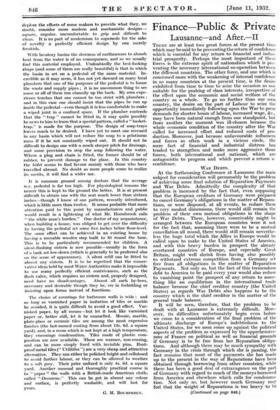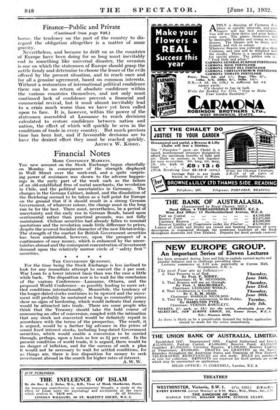Finance—Public & Private
Lausanne—and After.—II
TirERE are at least two great forces at the present time which may be said to be preventing the return of confidence which is essential for any return to financial and indus- trial prosperity. Perhaps the most important of these forces is the extreme spirit of nationalism which is pre- venting the necessary international co-operation between the different countries. The other force, and one which is concerned more with the weakening of internal confidence in so many countries at the present time, is the desire exhibited from time to time to seize the occasion as one suitable for the pushing of class interests, irrespective of the effect upon the economic and social welfare of the country as a whole. To go no further than our own country, the desire on the part of Labour to seize the opportunity immediately following upon the War to press demands for shorter hours of labour, increased wage, &c., may have been natural enough from one standpoint, but from another the moment was ill-chosen because the whole economic condition of the country after the War called for increased effort and reduced costs of pro- duction. Moreover, just because unfavourable influences and forces so often work in a vicious circle, the mere fact of financial and industrial distress has tended to strengthen and make more aggressive those forces, both international and national, which are antagonistic to progress and which prevent a return o confidence.
WAR DEBTS.
At the forthcoming Conference at Lausanne the main subject for consideration will presumably be the problem of achieving some final solution of Reparation Payments and War Debts. Admittedly the complexity of that problem is increased by the fact that, even supposing that the European creditors of Germany were prepared to cancel Germany's obligations in the matter of Repara- tions, or were disposed, at all events, to reduce them to very modest dimensions, there would still remain the problem of their own mutual obligations in the shape of War Debts. These, however, conceivably might be arranged between the European countries were it not for the fact that, assuming there were to be a mutual cancellation all round, there would still remain neverthe- less the huge total which the Allies in Europe would be called upon to make to the United States of America, and with this heavy burden in prospect the already overtaxed countries of Europe, and especially Great Britain, might well shrink from having also possibly to withstand extreme competition from a Germany set free from all obligations in the matter of Reparation Payments. Not only so, but the fact of this tremendous debt to America to be paid every year would also reduce to vanishing point the prospect of any return to some- thing like an equilibrium in the international trade balance because the chief creditor country (the United States) as regards War Debts also happens to be the country which is the chief creditor in the matter of the general trade balance. It will be seen, therefore, that the problem to be dealt with at Lausanne is extremely difficult. More- over, its difficulties unfortunately begin even before we come to a consideration of the final problem of the ultimate discharge of Europe's. indebtedness to the United States, for we soon come up against the political aspects of the problem as expressed by the apprehensive- ness of France on political as well as financial grounds if Germany is to be free from her Reparation obliga- tions. And although there may be much sympathy with Germany in the crisis through which she is passing, the fact remains that most of the payments she has made up to the present in the way of Reparations have been obtained through borrowing from other countries, while there has been a good deal of extravagance on the part of Germany with regard to much of the moneys borrowed from America and elsewhere which calls for condemna- tion. Not only so, but however much Germany may feel that the weight of Reparations is too heavy -to be (Continued on page 848.) Finance-Public and Private
(Continued from page 846.) borne, the tendency on the part of the country to dis- regard the obligation altogether is a matter of some gravity. Nevertheless, and because to drift on as the countries of Europe have been doing for so long must inevitably end in something like universal disaster, the occasion is one on which the statesmen of Europe should grasp the nettle firmly and determine to choose the lesser of the evils: offered by the present situation; and to reach once and for all a genuine agreement, based on common interests. Without a restoration of international political confidence there can be no return of absolute confidence within the various countries themselves, and not only must continued lack of confidence prevent a financial and commercial revival, but it must almost inevitably lead to a crisis much worse than we have yet been called upon to' face. It is, however, within the power of the statesmen assembled at Lausanne to reach decisions calculated to restore .confidence between nation and nation, the effect of Which will quickly be seen in the conditions of trade in every country. But much precious time has been lost, and if favourable decisions are to have the desired effect they must be reached quickly.
ARTHUR W. KIDDY.



































 Previous page
Previous page